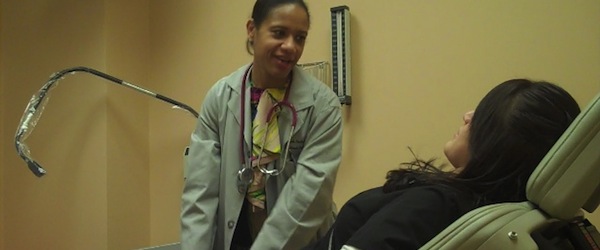Does Generation Y have job satisfaction? What must employers do to attract and retain Gen Y employees? Although it’s always hard to generalize about an entire generation, surveys, polls and statistics do help to paint a picture.
EPISODE 13: GENERATION Y with SHARALYN HARTWELL
For our Audio Podcast: Careers Out There on iTunes
TODAY’S GUEST
 Sharalyn Hartwell: Generation Y Examiner
Sharalyn Hartwell: Generation Y Examiner
College Major: Communications (Broadcast & Print Journalism emphasis)
College: Utah State University in Logan, Utah
High School: West Jefferson High School in Terreton, Idaho
First Job Ever: McDonald’s
Worst Job Ever: McDonald’s
Generation Y In the Workplace
Today’s guest Sharalyn Hartwell, the National Generation Y columnist for online newspaper The Examiner, shares her extensive research data and insights on job satisfaction for Generation Y in the workplace. Let us know what you think in the Comments – do you feel a sense of job satisfaction? If not, what is it that’s making you unsatisfied? Are you a job hopper? What do you feel you need in the workplace to achieve job satisfaction? Let us know!
We apologize for some Skype issues that make the audio sync come and go. Let us know if you have research data on whether Gen Y likes 1970s kung fu movies!
TRANSCRIPT OF TODAY’S INTERVIEW
Today we’re taking a look at Gen Y in the workplace. Our guest is Sharalyn Hartwell and she’s the national Generation Y columnist for the Examiner, an online newspaper. It’s going to be a great show as we take a look at Generation Y so stick around.
[theme song]
OK we’re back and our guest is here today. Welcome Sharalyn Hartwell.
Guest Generation Y Columnist Sharalyn Hartwell: Hi Marc. Thank you for having me.
Luber: Thanks for joining us. So let’s talk about Gen Y in the workplace. It’s your specialty. Fill us in. What is the deal? Everybody talks about Gen Y as being this self-entitled group.
As a recruiter I saw this all the time: dealing with law firms who would say to me, “you know, these kids don’t get it. They don’t work hard enough – they just don’t get it.” What’s the reality?
Sharalyn Hartwell: Well I have to say Marc, while there’s always a reason that stereotypes are in place, I mean there’s always going to be some people who perpetuate things. On a whole, it’s probably not as bad as most people tend to think. It’s kind of one of those things where there may be a few rotten apples making the whole bushel bad and there’s actually data that supports it. And you have to learn how to look at that data and really dive through and see what it’s really saying.
A perfect example is some research that was sent out by the Conference Board earlier this year. And it was basically evaluating job satisfaction among Americans as a whole. And so what they designated as the Gen Y group was the 18-25 year-olds and they were the least satisfied with their jobs overall. There was only actually less than 37% of the 18-25 age group said that they were satisfied or happy with their jobs.
So of course then everyone jumps on the bandwagon: All of the news articles you saw around this press release were showing and thinking how Gen Y is just these spoiled little brats, aren’t even happy that they have a job in this poor economy…that whole thing. So there’s of course that.
But if you look through the archives of the Conference Board and the same survey that they’ve conducted for years: back in 1987, it was the 18-25 group who was the least satisfied then and it was the Xers. It’s just really – that’s when they went for their entry level jobs, paying their dues…no one likes that!
Luber: Right. Of course.
Sharalyn Hartwell: So you have to look at it that way. But what I think is an interesting thing is the most satisfied group was actually the 26-34 year-olds. And they – by most definitions, that’s still the bulk of those are Gen Y. Some definitions go as old as 32 this year – they’re still considered Millennials.
So the bulk of them were the most satisfied. And that’s when you’re getting past that entry level hump and you’re actually starting to get some momentum with your career. Of course they should be the ones who are the most satisfied and excited with their jobs.
Luber: Yeah that definitely makes sense. Interesting. And so how would you compare that to the Baby Boomers?
Sharalyn Hartwell: Well it’s actually not that out of line, Marc, with really the rest of America. In fact, a really truly alarming thing I think if you look at the overall picture: it’s really easy for us to get caught up in the landscape of “oh there’s this new generation and they’re changing the workplace”.
It’s really just the workplace that’s changing overall! They found that there were only 45% of Americans who said they were satisfied or happy with their jobs. That’s less than half! And that’s a stark decrease from 1987 when they found that 61% were happy with their jobs or felt satisfied.
So you know the 37% in the 18-25 bracket is even less than what the overall population is saying. So that’s really what the real picture – the scope of the workplace in America is changing and people are having a hard time getting used to it.
Luber: And it’s just been less friendly for individuals in the sense that you are not guaranteed a job any more for life once you join a company.
Sharalyn Hartwell: Exactly. And I think that’s something that’s probably going to affect Millennials more than anyone else. Obviously Boomers are feeling that impact – they felt the impact of the economy more than anyone: losing so much out of their retirement and their 401(k)s and what not.
You know Xers, they felt it too because it’s their prime earning years right now. So they’re seeing a huge inhibition right from the beginning.
But with Millennials, it’s kind of almost making them a little bit jaded from the start. You know, they’re seeing mom and dad have worked really hard for this company through their whole lives and now they’re really not getting a whole lot of reward for it. And you know, it’s not even necessarily something personal: it’s just business to use a cliched phrase. But during tough economic times it’s what happens.
So I think it will be a really interesting thing to watch over the next several years as Millennials age to see the impact of the starting point of their career being during such a terrible recession.
Luber: Well I can say as a recruiter that we would look at resumes from people who were Gen X and Gen Y and you would see more and more over time that people would be at a job for 1 year, for 2 years…instead of the 3-4-5 years. And very often, I mean, you have to ask the candidate and say, “well, are you there because you just jump around all the time? You can’t sit in one place? Or because the companies keep disappearing and laying everybody off?” And very often that’s exactly what it is: you don’t even have the choice of staying anywhere for more than a year because they’re not even going to be around and be able to keep the jobs there.
Sharalyn Hartwell: Absolutely. Or they’re restructuring and the company’s still there but they’ve eliminated their division or made it so one person is now handling 4 job responsibilities – those sorts of things.
But I actually think Marc is that you actually brought up something too – an interesting piece of data on job hopping: you know that is something that Millennials are more comfortable doing than others.
In fact, there was some data that I found this year by Odeko, which everyone knows is a staffing firm – and they did some evaluations this year and the number of Millennials looking for new work in 2010 doubled since 2008.
So it’s actually 30% of Millennials are planning to seek new employment this year in 2010 versus 14% in 2008. Even though most of them said that this was the roughest economic time period they’ve ever witnessed, they’re still looking. And not only just Millennials – everyone.
It’s kind of like everyone feels like they really don’t owe a company anything anymore. They’re just going to do what’s best for them.
Luber: And is there any research to show what companies are doing to accommodate that feeling amongst Millennials?
Sharalyn Hartwell: Well there’s things that they definitely can do. We know what Gen Y tends to like at an office. And things they can do to really help keep them around and to entice them.
So from a surface level, there was actually an interesting global study conducted by Johnson Controls Workplace Solutions. And they have some things that Gen Y looks for and what they value in a workplace environment. You have to understand this is a global survey so that kind of skews things a little bit: it’s always going to be different across cultures. But you know some of the important things were design – so they’re actually looking for places where the workplace environment and design are similar to the contemporary feels of the places that they’re renting right now. And we hear a big thing about sustainability and Gen Yers and green, so they want that, they want an environmentally friendly place, but not at the sacrifice of the design. So I thought that was kind of an interesting thing.
So those are a little more superficial, but there are 2 things that are actually more specific data points: they want a mobile working environment.
And I have to say I completely echo that. Every place I’ve worked was always a place that had internet access but we never had wireless. So when we want to go to a break-out session into a conference room or an atrium or sometimes outside, you couldn’t even get on to our servers to be updating data or whatever we’re meeting to do, so it made it so that you couldn’t ever really work outside of your little desk.
So Gen Y feels that technology isn’t a luxury anymore – it’s an absolute necessity to conduct business.
Luber: Interesting. Yeah, I visited a friend who works at Google in Chicago and everything was wireless there. The vibe was great because people were in all these little rooms: there were beanbag chairs in some rooms, they were all just sitting around in beanbags talking with their laptops. It was a really good setup. It looked like it was a great work environment.
Sharalyn Hartwell: Oh absolutely. I mean everyone knows that is Google’s reputation. I mean my parents, who really know nothing about the whole corporate environment stuff, they know, “oh Google’s the greatest place to work,” because they’re used to hearing that and hearing that. I, like you, actually visited a friend that worked at the Mountain View location and same thing: they have conference time. They have all sorts of things that keep that team environment in place and just make it a more comfortable work environment– and they work hard and that’s why Google is such a successful company. They have good employees and they attract the world’s best employees.
Luber: What about flexible schedules? I’m assuming that that’s very important to people, to be able to work from home?
Sharalyn Hartwell: Yes. I mean if you want to talk about basic benefits to entice Generation Y, that’s going to be a huge one: and the option to telecommute. There’s a lot that are really looking into location independent lifestyles these days and just having flexibility where they have that choice to do that.
You know with that same Johnson Controls survey, the other thing they mentioned that Gen Y really likes is they want to have ample breakout rooms on site at the office but then they also want to have easy access to coffee shops, which shows how they also want to be able to work solo sometimes too. So they can go there and just pound out their work and the ability to work from home and get the things out that they need to. But you know that the Millennials aren’t alone in that.
And that’s the common misconception: that the Millennials are the only ones who want to do that. But there’s some data that actually suggests otherwise. Achieve Global did a study earlier this year and it was finding out what were the factors that motivated employees the most. And 37% of Boomers and Gen Xers think that the most motivating factor for them at work was flexibility in schedule and time off to do the things that they enjoy outside of work.
Now again, that’s a slightly different case than what entices someone to come to your company versus what motivates you once you’re there, but I think that lends credence to my point that it’s not just Millennials.
Luber: Yeah, and it all ties together. All those things, whether it’s enticing you to come there or once you’re there, it kind of ties in together with the satisfaction of the workplace.
Sharalyn Hartwell: Absolutely.
Luber: So let’s open this up to everybody. You guys, let us know – leave some comments – leave feedback in the Comments section. What do you guys feel you need for job satisfaction in the workplace? And how have you felt about your own personal satisfaction so far with your own work experience? Let us know. And Sharalyn, before you go, tell us a little bit about yourself. When you’re not writing for the Examiner, what is your background?
Sharalyn Hartwell: I have a very extensive media background. I won’t bore you with all the details. I’ve kind of done a lot of things. But a lot of sales and marketing.
Right now I do some sales and marketing consultation work: some contract work. And I’ve dealt with media for over 10 years: either on the production side as a writer or was also producer and host of a TV show, so I know your side of things! And also on the sales side working with HD video technology, print and online media.
Luber: Excellent! Well thank you so much for sharing your expertise here today. Everybody: as always at Careers Out There you get real advice from real professionals like Sharalyn. Thanks again for joining us.
Sharalyn Hartwell: Thank you.
Luber: You guys will see more: We’re going to keep talking to Sharalyn in future episodes so comes on back to Careers Out There. Thanks for watching.
(C) 2010 Careers Out There
RELATED POSTS
Generation Y: What Motivates Gen Y In the Workplace
How To Discover Your Strengths To Find A Career Fit
Job Interviewing Tips: Focus On What You Bring To the Table







